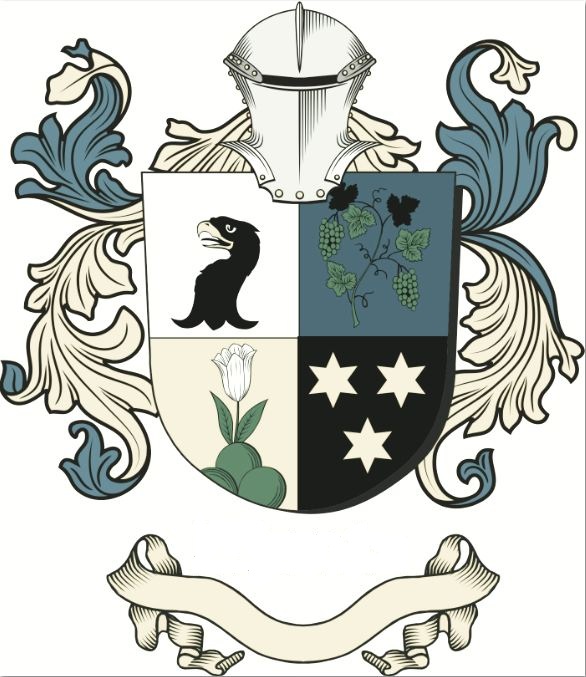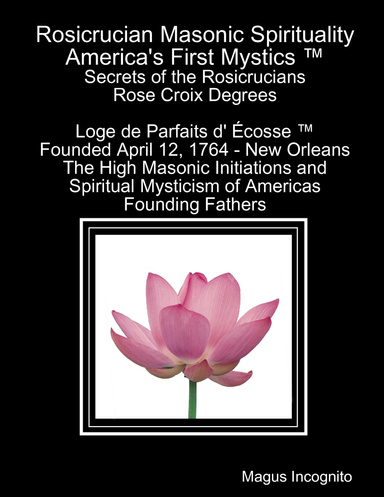Rosicrucian Society ™
Rosicrucian Manifesto
Lodge of Perfection – Est. 1764 – New Orleans Lux Americana
For: The Golden Temple of the Rosy Cross & Templiers et Rose Croix d'Orient Mystical Christian, Hermetic, Hellenistic, Buddhist, Brahmin, & Taoist Wisdom By: Magus Incognito
“Before the Illuminati & Before the Skull and Bones”
The Rosicrucian Manifestos
The Rosicrucian manifestos caused immense excitement throughout Europe: they declared the existence of a secret brotherhood of alchemists and sages who were preparing to transform the arts, sciences, religion, and political and intellectual landscape of Europe while wars of politics and religion ravaged the continent. The works were re-issued several times and followed by numerous pamphlets, favourable and otherwise. Between 1614 and 1620, about 400 manuscripts and books were published which discussed the Rosicrucian documents. The peak of the so-called "Rosicrucianism furor" was reached when two mysterious posters appeared in the walls of Paris in 1622 within a few days of each other. The first one started with the saying "We, the Deputies of the Higher College of the Rose-Croix, do make our stay, visibly and invisibly, in this city (...)" and the second one ended with the words "The thoughts attached to the real desire of the seeker will lead us to him and him to us".[7] The legend inspired a variety of works, among them the works of Michael Maier (1568–1622) of Germany, Robert Fludd (1574–1637) and Elias Ashmole (1617–1692) of England, Teophilus Schweighardt Constantiens, Gotthardus Arthusius, Julius Sperber, Henricus Madathanus, Gabriel Naudé, Thomas Vaughan, and others.[8] In Elias Ashmole's Theatrum Chimicum britannicum (1650) he defends the Rosicrucians. Some later works with an impact on Rosicrucianism were the Opus magocabalisticum et theosophicum by George von Welling (1719), of alchemical and paracelsian inspiration, and the Aureum Vellus oder Goldenes Vliess by Hermann Fictuld in 1749. Michael Maier was ennobled with the title Pfalzgraf (Count Palatine) by Rudolph II, Emperor and King of Hungary and King of Bohemia. He also was one of the most prominent defenders of the Rosicrucians, clearly transmitting details about the "Brothers of the Rose Cross" in his writings. Maier made the firm statement that the Brothers of R.C. exist to advance inspired arts and sciences, including alchemy. Researchers of Maier's writings point out that he never claimed to have produced gold, nor did Heinrich Khunrath nor any of the other Rosicrucianists. Their writings point toward a symbolic and spiritual alchemy, rather than an operative one. In both direct and veiled styles, these writings conveyed the nine stages of the involutive-evolutive transmutation of the threefold body of the human being, the threefold soul and the threefold spirit, among other esoteric knowledge related to the "Path of Initiation". In his 1618 pamphlet, Pia et Utilissima Admonitio de Fratribus Rosae Crucis, Henrichus Neuhusius writes that the Rosicrucia ns left for the East due to the instability in Europe caused by the start of the Thirty Years' War, an idea afterwards echoed in 1710 by Samuel Ritcher, founder of the secret society of the Golden and Rosy Cross. More recently René Guénon, a researcher of the occult, presented this same idea in some of his works.[9] However, another eminent author on the Rosicrucians, Arthur Edward Waite, presents arguments that contradict this idea.[10] It was in this fertile field of discourse that many "Rosicrucian" societies arose. They were based on the occult tradition and inspired by the mystery of this "College of Invisibles". |

© Copyright Societas Rosicruciana.com , 2008-2020 All Rights
Reserved
Home Join Manifesto History Degrees Society Contact High Degrees Rose Croix Degrees Rosicrucian References Resources Masonic Rosicrucian Degrees History Hermetic Beliefs The Magus Temple of Rosy Cross Prosperity Contact Society Confessio Fama Text Societas Rosicruciana Rosicrucian Thought Force Character Audio Books
